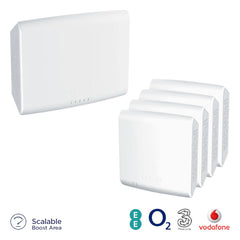About BBC Studioworks
BBC Studioworks is a commercial subsidiary of the BBC, providing studios and postproduction services to all the major TV broadcasters. Its studio facility in White City, London is home to some of the nation’s most-watched and loved television shows, including The Graham Norton Show, Good Morning Britain, This Morning, Sunday Brunch and The Jonathan Ross Show. Television Centre has three fully-equipped TV studios, ranging from 3,430 ft² to 10,800 ft² which are fitted with industry-leading technology. Other facilities include edit suites, apparatus rooms, dressing rooms, green rooms, and production offices.
Business Needs
Their plant in Baglan, Neath Wales is 1 square mile in size and within their warehouses they experienced very poor mobile signal. The warehouses consist of steel structures and manufacturing machinery. Internal communications within the plant could only be conducted by a two-way radio or Wi-Fi calling, which wasn’t practical in all areas of the business. There was no mobile signal that could be used.
The purpose-built production facility is soundproofed throughout and comprises thick concrete external and internal walls. While this creates ideal conditions to capture TV shows, it can severely hinder mobile signal from penetrating the building.
With the facility used by BBC Studioworks’ employees and freelancers, client production teams, on-screen talent and contributors, an in-building mobile coverage solution to cover all networks was required.
Mindful of the problem, BBC Studioworks set about finding a solution that could provide adequate mobile coverage for the scale and complexity of the building.


The Solution
 BBC Studioworks was referred to Frequency, the master distributors of CEL-FI products in the UK, by Nextivity.
BBC Studioworks was referred to Frequency, the master distributors of CEL-FI products in the UK, by Nextivity.
Colin Giles, CEL-FI Account Manager at Frequency Telecom engaged with BBC Studioworks over several consultative sessions to discuss the requirements and present the business case for a CEL-FI solution. With access to the site plans and an in-depth understanding of the requirements, Frequency provided BBC Studioworks with the outline of a solution design for addressing the coverage issues. However, it was imperative for a building of this size and structure for a site survey to be carried out to further refine and develop the design.
“A site survey is crucial for an installation of this size. No two buildings are the same. Only once you are on-site do you get to see the full extent of the layout of the building and the materials used. A survey also exposes the internal and external obstructions to mobile signal, not always visible on the site plans. This is further qualified by using specialist tools to measure the signal strength and quality inside and outside of the building,” Giles explains.
Zonewave, one of Frequency’s enlisted CEL-FI certified installation partners, conducted the survey and found that the external signal quality and strength was at a sufficient level which CEL-FI could utilise to enable the deployment of a reliable, stable solution inside the building. The survey also identified suitable cable routes from the roof down into the building and the use of existing cable trays and trunking to minimise disruption.
Armed with all information from the survey, the proposal to BBC Studioworks recommended CEL-FI QUATRA 1000 as the best fit and most cost-effective solution to boost the mobile coverage across all floors and all networks internally.
The Results
Once installed, the all-network CEL-FI QUATRA 1000 solution consisted of 14 x QUATRA 1000 Network Units, 53 x QUATRA 1000 Coverage Units and 4 x external MIMO antennas spread over 16 positions throughout the building, with the external antennas mounted on the roof of Studio TC1.
The solution now provides mobile coverage on all networks to all areas within the building. All building users can now use their mobile devices for voice and data services throughout the building.








